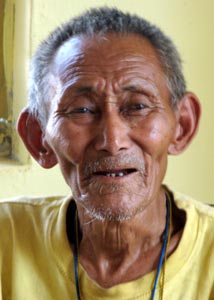Name: Pasang Dhondup
(Alias: No)
Gender: Male
Interview Age: 82
Date of Birth: 1928
Birthplace: Kharten, Utsang, Tibet
Year Left Tibet: 1959
Profession: Dairy Farming, Farming
Monk/Nun: No
Political Prisoner: No

Interview No.: 5M
Date: 2010-04-05
Language: Tibetan
Location: Doeguling Settlement, Mundgod, Karnataka, India
Categories: Chinese Invasion and Occupation
Keywords: childhood memories, Chinese -- oppression under, Chinese rule -- life under, environment/wildlife, escape experiences, forced labor, herding, marriage practices, refugee in India -- life as, taxes, Utsang
Summary:
When he was 10 years old, Pasang Dhondup started grazing animals. He describes a typical day in the life of a shepherd. His family's main occupation was farming and rearing animals. He briefly touches upon the subject of marriage in a Tibetan family and his own marriage. He also talks about the tradition of admitting one male child to the monastery as a form of tax from every family.
After the Chinese invasion Pasang Dhondup worked as a transporter of Chinese provisions, as directed by them. The people of his village supplied yaks, horses and men for the Chinese. Passang Dhondup talks about how the Chinese killed wild animals for food, which the Tibetans had never killed due to Tibetan laws.
Pasang Dhondup's entire village escaped from Tibet together, but they were nearly forced to return home when a Tibetan "spy" for the Chinese reported their journey. The escape route crossed five mountain passes and brought them a month later to Mustang in Nepal. Later Passang Dhondup was sent to Manali, India to construct mountain roads and finally settled in Mundgod.
Interview Team:
- Marcella Adamski (Interviewer)
- Tenzin Yangchen (Interpreter)
- Pema Tashi (Videographer)

